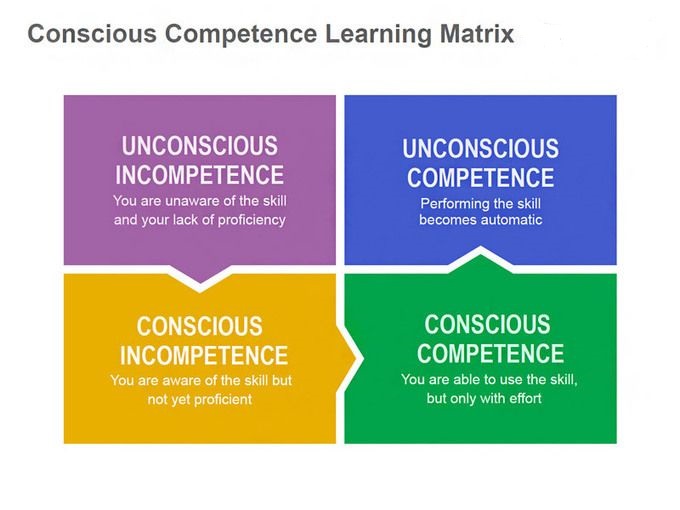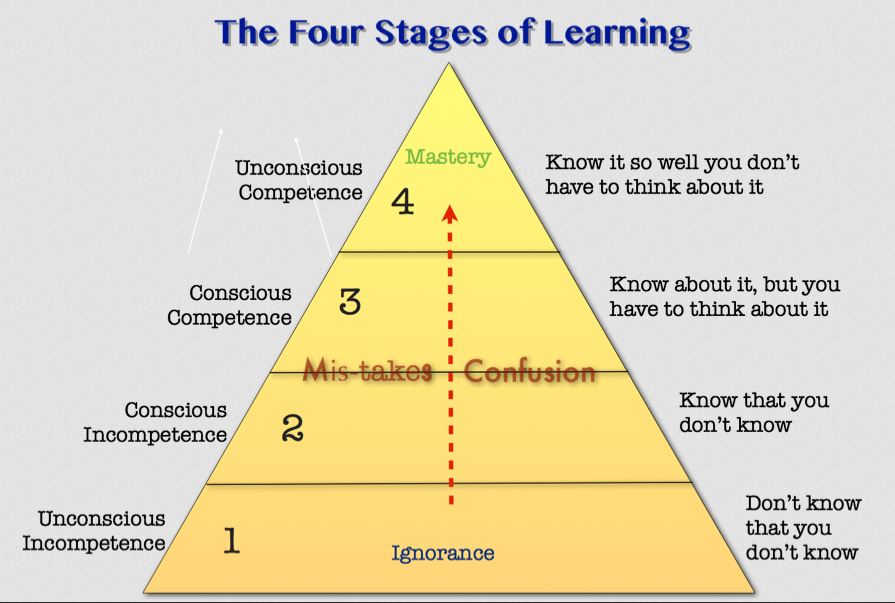Stages Of Learning
Why 95% Of Your Thoughts Are An Unconscious Competence

The stages of learning represented in the conscious competence model are a popular and intuitive approach.
The model is attributed to many different possible originators.
The primary value of the model is that it helps us to realistically manage our own emotions and expectations during what is often a difficult, prolonged and challenging learning process.
On this site, the stage of learning model is included in the same section as Bridges Transition Model and Kubler Ross Change Curve.
The purpose of these models is to put the business of personal change into a framework and context of what you may be encountering, and a framework for deeper understanding of what has to happen for your personal change goal to be achieved.
The 10,000 Hours Rule
We are probably all familiar with the "10,000-Hour Rule", based on a study by Dr. K. Anders Ericsson postulates that great achievement (based on great competence) requires an enormous amount of time, 10,000 hours to be precise.
“Many people think what Anders discovered is that quantity of practice makes you a champion,” said Angela Duckworth, a professor of psychology at the University of Pennsylvania. “That’s disastrously incomplete. It’s quantity AND quality. One of his insights that I hope will have a lasting legacy is people need to work hard, but also smart.”
Professor Ericsson focused on what he called “deliberate practice,” which entails immediate feedback, clear goals and focus on technique.
According to his research, the lack of deliberate practice explained why so many people reach only basic proficiency at something, whether it be a sport, pastime or profession, without ever attaining elite status.
Anders Ericsson, Psychologist and ‘Expert on Experts
The 4 Stages Of Learning
How to move from “I don’t know what I DON’T know” to “I don’t know what I DO know!

According to the conscious competence model there are 4 stages of learning:
Stages Of Learning 1. Unconscious Incompetence
You Don't Know that You Don't Know
At this stage you are in a state of blissful ignorance.
You have a complete lack of knowledge and skills in the subject in question.
On top of this, you are unaware of your lack of skill, and your confidence will therefore exceed your abilities.
Stages Of Learning 2. Conscious Incompetence
You Know that You Don't Know
At this stage you find that there are skills you need to learn, and it may come as a shock to find that there are others who are far more competent than you are.
As you realise this, your confidence drops, and you go through an uncomfortable period as you learn these new skills.
Stages Of Learning 3. Conscious Competence
You Know that You Know
At this stage you acquire the new skills and knowledge.
You put your learning into practice and you gain confidence in carrying out the tasks or jobs involved.
You are still concentrating on the performance of these activities, but as you gain more practice and experience, the exercising of these skills becomes increasingly automatic.
Stages Of Learning 4. Conscious Competence
You Don't Know that You Know – You Are Functioning On 'Auto-Pilot'"
At this stage your new skills are now habits, and you perform the task and exercise your skills without conscious effort – you are functioning “on-auto-pilot” and thus with ease.
You are now at the peak of your confidence and ability.
Personal change is not a hobby, and it is not a "pick and mix" counter. It is a serious business. You can read all you like about personal change and you may, over time, become well informed about it. But you won't change. You can make promises and commitments to yourself about personal change, buy all the latest books and DVDs and go to meditation classes - but still it unlikely that you will change. Managing personal change is inherently tricky. People usually assume that it is skills based, and that you can be taught to change. However, whilst it is true that you can be taught, generally you won't change. Your failure to achieve a personal change goal isn’t the result of a
lack of will-power, it’s your "emotional immune system" trying to
protect you. Most of our deepest beliefs were instilled in us by design or default when we were very young and their primary intention was to keep us safe. It is estimated that approximately 95% of your thoughts are subconscious To slightly amend Jung's famous saying : “Until you make the sub-conscious conscious, it will direct your life and you will call it fate.” So if we relate stages of learning to this, we are saying in effect that 95% of your thoughts are running as unconscious competence. Therefore to successfully implement any personal change goal you have to know how to uncover your innate resistance and make it conscious; and then to change, to know how to re-install a more supportive belief. All of this is the foundation of the purpose and core themes of this site, namely:
"Knowing how to think effectively matters because the outcomes that you
experience are determined by your responses to the events in your life.
The strength and quality of your response is determined by the skills
and the experience you bring to it - and that is all based on knowing
how to think effectively."
"How Can I Change" which sets out a framework involving the 4 key stages of personal change and 10 steps within these stages. "3 Keys Solutions" which are one page summary sheets of key action points and resources based on material on this site that will show you to take action now, to think effectively and to change your life. Personal change is hard, but it is possible. The compounded long term benefit to the improved quality of the outcomes you can achieve make it immensely worthwhile. But this is only for the committed: "Narrow is the gate and difficult is the way which leads to a better life, and there are few who find it." This site can help you become one of those few.
Further Reading: Rewiring Your Autopilot – How To Harness Your Subconscious Mind Return from "Stages Of Learning" to: Managing Personal ChangeStages Of Learning and Managing Personal Change
This can be paraphrased as: change comes from within.
As a start point, I would refer you to:
LATEST ARTICLES
Does Prayer Work? The Psychology of Prayer, Meditation and Outcomes
 Reality Is A Complex System Of Countless Interactions - Including Yours. So does prayer work? The problem is that the question itself is usually framed in a way that guarantees confusion. We tend to a…
Reality Is A Complex System Of Countless Interactions - Including Yours. So does prayer work? The problem is that the question itself is usually framed in a way that guarantees confusion. We tend to a…Living in Survival Mode Without Surrendering Mental Authority
Living in Survival Mode Without Surrendering Mental Authority
 Clear Thinking When You’re Just Trying to Stay Afloat. Many people today are overwhelmed because they are living in survival mode - not temporarily, but as a persistent condition of life. For many, th…
Clear Thinking When You’re Just Trying to Stay Afloat. Many people today are overwhelmed because they are living in survival mode - not temporarily, but as a persistent condition of life. For many, th…Manifestation Without Magic: A Practical Model
 Manifestation without magic is not a softer or more intellectual version of popular manifestation culture. It is a different model altogether. Popular manifestation teachings tend to frame reality as…
Manifestation without magic is not a softer or more intellectual version of popular manifestation culture. It is a different model altogether. Popular manifestation teachings tend to frame reality as…Staying Committed When You Can't See Progress - The Psychology of Grit
 Uncertainty Is Not The Absence Of Progress, Only The Absence Of Reassurance. One of the most destabilising experiences in modern life is not failure, but uncertainty and staying committed when you can…
Uncertainty Is Not The Absence Of Progress, Only The Absence Of Reassurance. One of the most destabilising experiences in modern life is not failure, but uncertainty and staying committed when you can…The Battle For Your Mind - How To Win Inner Freedom In A Digital Age Of Distraction
 From External Events to Inner Events. We often think of “events” as things that happen out there: the traffic jam, the rude comment, the delayed email reply. But what truly shapes our experience is wh…
From External Events to Inner Events. We often think of “events” as things that happen out there: the traffic jam, the rude comment, the delayed email reply. But what truly shapes our experience is wh…How to See Your Thoughts Without Becoming the Story
 A Practical Guide to Thought-Awareness. You can spend your life inside the stories of your mind without ever learning how to see your thoughts clearly and objectively. Most of the stuff we tell oursel…
A Practical Guide to Thought-Awareness. You can spend your life inside the stories of your mind without ever learning how to see your thoughts clearly and objectively. Most of the stuff we tell oursel…The Collison Decision Matrix - A Simple Framework for Better Choices
 The Collison Decision Matrix Is A Practical Everyday Thinking Tool. Most of us spend a surprising amount of time worrying about decisions. From small ones such as what to wear, what to eat, what to te…
The Collison Decision Matrix Is A Practical Everyday Thinking Tool. Most of us spend a surprising amount of time worrying about decisions. From small ones such as what to wear, what to eat, what to te…The Power Of Asking The Right Question
 The Power Of Asking The Right Question Lies In The Quest For Insight. To experience the power of asking the right question you must develop the practice of asking questions. The best way to improve th…
The Power Of Asking The Right Question Lies In The Quest For Insight. To experience the power of asking the right question you must develop the practice of asking questions. The best way to improve th…Site Pathways
 Here is a site pathway to help new readers of Zen-Tools navigate the material on this site. Each pathway is based around one of the many key themes covered on this site and contain a 150 word introduc…
Here is a site pathway to help new readers of Zen-Tools navigate the material on this site. Each pathway is based around one of the many key themes covered on this site and contain a 150 word introduc…How To Live With Contradiction - Beyond Thought Let Stillness Speak
 A major impact on so many peoples' lives is the situational contradiction of unfilled realistic expectations. So where does all this leave us? Well here we are, with mental equipment that is more lim…
A major impact on so many peoples' lives is the situational contradiction of unfilled realistic expectations. So where does all this leave us? Well here we are, with mental equipment that is more lim…How To Trust The Process Of Mindfulness - Right Now
 In mindfulness, the process isn’t some distant goal — it's what is happening right now. When we talk about how to trust the process of mindfulness the credibility of the process is heavily dependent…
In mindfulness, the process isn’t some distant goal — it's what is happening right now. When we talk about how to trust the process of mindfulness the credibility of the process is heavily dependent…